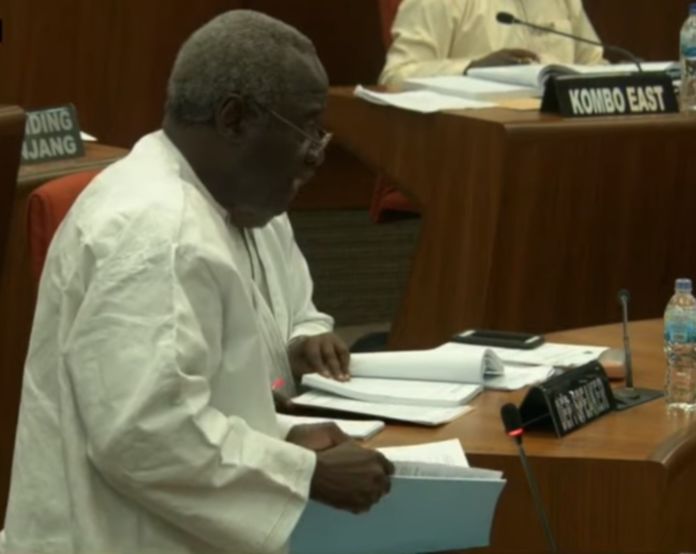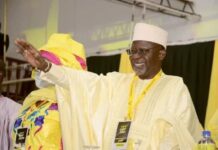The next chapter reflects a departure from an exercise in fiction writing and plunging into the mud of absurdity and superfluity.
THE AUTHOR WROTE:
I am sure the Honorable gentleman is not questioning the integrity of the leadership of the protest movement as most were very instrumental in the victory of 2016 when most of these leaders contributed wealth and sweat for their country. However Hon. Sallah must, should and can make a difference between forcing a government to resign and overthrowing a government. The former is perfectly legal and not uncommon in a democracy, while the latter is not only illegal but very undesirable in today’s political realities. Under our current constitution, it is not only possible but in fact most likely for our president or National Assembly Members to be elected by a minority of the electorate. Indeed the current president was elected by 43% of Gambians who went to the polls and under 30% of all eligible voters. The figures are less flattering for some of our NAMs. Again this is accepted in even advanced democracies. However where a significant (not necessarily the majority) portion of the population feel strongly about a fundamental electoral issue like a campaign promise and then come out to show their displeasure/anger/disappointment to those they feel betrayed their hopes and aspirations in a peaceful and legal manner cannot and could not by any stretch of a normal person’s imagination be construed as an “attempt to overthrow a government”. In fact in most democracies, ruling governments are all the time under pressure from civil society groups be it animal rights, climate change, gay and lesbian, religious fundamentalist, far right/left, etc., etc. The pressure is usually in the form of peaceful protest accompanied by mass mobilization and advocacy programs just like the 3 years Jotna group is doing. How are they fooling the youths of our country? There was sufficient (more than sufficient by me) discussions and public debates on this issue since mid-2017 by almost all sections of Gambian society that it is inconceivable that anybody will participate in the last protest ignorant of either the realities or the possibilities that the protest can achieve. I do remember Hon. Sallah at one time advocating for a national dialogue on this issue. Any peaceful and legal attempt to achieve this national dialogue should not be seen as an attempt to forcefully over throw a democratically elected government. Democracy is like a game of football. Some teams like to take chances with long shots outside the penalty box while others want to wait till they are inside the 6 yrds box before shooting. In any case we achieve little by complaining of our opponents’ style of play so long they keep within the rules of the game.”
HALIFA SALLAH
Is it not interesting that a statement I made with the fundamental objective of challenging self-seeking elites who misinterpret the law and give the impression that what could land young people in jail is perfectly legal, is now being attributed to an attack on a movement which applied for a permit to hold a peaceful procession in line with the Public Order Act and further assembled to demonstrate peaceably as provided for in Section 25 Subsection 1(d) of the Constitution and which is yet to be found guilty of attempting to bring down a government by forceful means.
My statements are well calculated and those who the cap fits should wear it rather than place it on the head of the ‘Three Year Jotna’ advocates as a matter of political convenience.
What could be more absurd than the following remarks?
’’However Hon. Sallah must, should and can make a difference between forcing a government to resign and overthrowing a government. The former is perfectly legal and not uncommon in a democracy, while the latter is not only illegal but very undesirable in today’s political realities.’‘
The author wants us to make a distinction between forcing a government to resign and overthrowing a government under Gambian law.
The question now arises:
Is it legal to force a government to resign under the Gambian constitution and law through civil disobedience?
Could the author quote the section of the law that authorizes the citizens to force a government to resign?
Section 25 Subsection 1 (d) of the Constitution states:
“Every person shall have the right to freedom to assemble and demonstrate peaceably and without arms.”
Section 25 (1) (f) adds
“Every person shall have the right to freedom to petition the Executive for redress of grievances and to resort to the Courts for the protection of his or her rights.”
There is provision to demonstrate peaceably without force. There is the freedom to petition the president and to resort to the courts. There is no provision to force a president to resign.
Section 69 of the Criminal Code adds,
“When three or more persons assemble with intent to commit an offence, or, being assembled with intent to carry some common purpose, conduct themselves in such a manner as to cause persons in the neighbourhood reasonably to fear that the persons so assembled will commit a breach of the peace, or will by such assembly needlessly and without any reasonable occasion provoke other persons to commit a breach of the peace, they are an unlawful assembly.
“It is immaterial that the original assembling was lawful if, being assembled, they conduct themselves with a common purpose in such a manner as aforesaid.
“When an unlawful assembly has begun to execute the purpose for which it is assembled by a breach of the peace and to the terror of the public, the assembly is called a riot, and the persons assembled are said to be riotously assembled.”
Hence , it is absurd for the author to give the impression that it will be considered a legal act under Gambian law to assemble just to force a government to resign . There is no such law. Those who claim that it exists are misleading the young people.
In 1994 , when the 1997 constitution was suspended and political activities banned under decree number 4 Sidia and my very self decided to engage in civil disobedience ,regardless of the peril or the cost , in order to challenge the ban knowing full well that we would face the full force of the law . This is why we did not involve any one in our civil disobedience. This is because of the fact that we could not resort to the courts or elections to find redress. On the other hand, once elections were restored in 1997 we worked to remove the government because of its excesses through the ballot box.
Furthermore, the author slipped into superfluity in the following words :
“Under our current constitution, it is not only possible but in fact most likely for our president or National Assembly Members to be elected by a minority of the electorates. Indeed the current president was elected by 43% of Gambians who went to the polls and under 30% of all eligible voters. The figures are less flattering for some of our NAMs. Again this is accepted in even advanced democracies. However where a significant (not necessary the majority) potion of the population feel strongly about a fundamental electoral issue like a campaign promise and then come out to show their displeasure/anger/disappointment to those they feel betrayed their hopes and aspirations in a peaceful and legal manner cannot and could not by any stretch of a normal person’s imagination be construed as an “ attempt to overthrow a government”.
Despite, stating ad-infinitum in my statement that protest against wrong doing is perfectly legal, the author risked superfluity by stating the same only to include the mathematics of the 2016 elections’ results.
It is hoped that the author is not saying that each of the 13 parties in the Gambia has the right to force a government to resign if the members are dissatisfied with the actions of government against them. This would be ridiculous.
This is the logic that has brought about unstable states.
Continued Part 4 https://foroyaa.net/covering-unpleasant-facts-with-curtain-of-ambiguity/



















